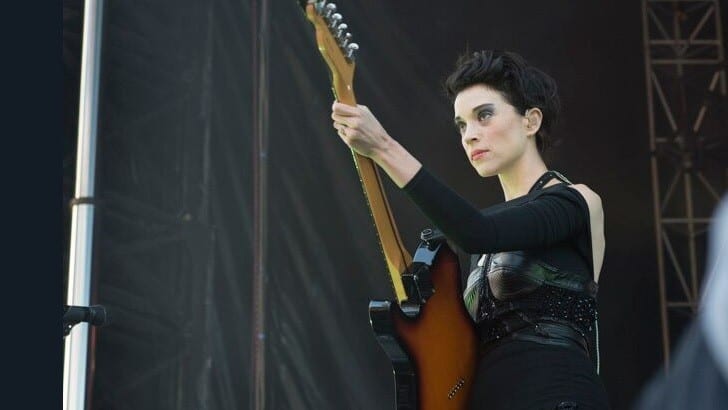
Earlier this year, several festival lineups went viral after someone photoshopped the all-male bands off the posters. Most of them were horribly stark. Reading Leeds, one of the UK’s biggest festivals, only had nine acts that included a female member. Arguing about diversity isn’t just a “thing” in 2015. It’s a discussion about sexism, inequality, and stereotyping that sees festival organizers overlooking the wealth of talent available. It’s not that acts with females aren’t talented. It’s not that there aren’t enough bands with women in them either. It’s an immature, outdated, idiotic prejudice known as sexism. The last few years have seen women dominating the charts, from Taylor Swift to Sleater-Kinney to Bjork to Beyonce to Yeah Yeah Yeahs to PJ Harvey to Charli XCX to Azealia Banks to FKA Twigs to Tegan and Sara to Nicki Minaj to Sky Ferreira to — you get the point. Festival organizers (somehow) don’t. It’s a refusal to separate preconceived notions of “good” music and the gender of the musician creating it, and it needs to stop.
It’s with a deal of pride that we can say Boston Calling didn’t go that route. The three-day festival chose to have equal representation. While the headliners are all-male (since Kim Deal is no longer with the Pixies), the meat of the middle card is heavily female, and most of those artists performed this Saturday.
Danish singer-songwriter MØ immediately demanded attention when she strut onto the red stage, thick brown braid swinging behind her. MØ (pronounced by us American folk as Meu”) glamorizes wintery delivery similarly to Lana Del Rey without the pout, stuffing choice cuts (including a cover of Spice Girls’ “Say You’ll Be There”) into a set of aerobic energy. Her vocals were so sturdy that those walking to food stands stopped in their tracks. A few hours later, Swedish singer Tove Lo used her own set of pop vocals differently. After tearing through “Habits” and “Talking Body”, she encouraged the crowd to lift their shirts — after she flashed them first. An otherwise #trending act was cleared up as a parallel to the #freethenipple campaign, a movement to fight against female oppression and censorship around the globe.
Saturday’s best sets came from two musical opposites. Marina and the Diamonds were first to do so, and the British singer-songwriter did electro-pop better than her male equivalents. Dancing on a stage adorned with inflatable bruised fruit and a solar system backdrop, Marina Diamandis worked her way through a setlist of songs written from her own point of view as well as her alter-ego, Electra Heart. Keeping a crowd’s attention during a ballad is nearly impossible, but Diamandis had them wrapped around her finger, many of whom belted along just as much to the thumping chorus of “Primadonna” as they did to the rounder swells of “Blue”.
Then the tour de force came, better known as St. Vincent. The New York-via-Texas singer-songwriter has been touring in support of last year’s self-titled full length for almost a solid year and a half now. Instead of her new setup getting old, it only gets better. Taking the form of a human-dressed robot, Annie Clark and her band turned up their amps and plugged in their pedals for a choreographed adventure into the gritty rock of a modern day guitar goddess. Clark’s tip toe stuttering and wide-eyed delivery accented the poppier sides of “Rattlesnake” and “Digital Witness”, but her real strength came in her heavier work. When she hit the second half of “Huey Newton”, she began screaming the lyrics, and “Bring Me Your Loves” saw her wrapping her fingers around our collective throat like a maniac ready to kill. After an extended version of “Your Lips Are Red” that saw her crowdsurf, let the masses play her guitar, and then collapse onto the stage, she bowed and exited. As the dude with the weed sunglasses and neverending blunt next to me said, “Holy shit, man. That was awesome.”
As for those all-male bands? They were decent. Krill pushed their reverb to the max for a weird set of dizzying indie rock, Gerard Way proved he makes pop easier to swallow than his emo days with My Chemical Romance, and DMA’s paid homage to Ben Gibbard and Doug Martsch’s vocals in unintentional ways. The evening’s headliners, My Morning Jacket, performed their first show since 2012’s New Years Eve performance–a softened jam with giant teddy bears, alt rock radio misses, and solos in melodic major keys–but even that fanfare return didn’t give them extra spunk to curious onlookers.
The one act who did raise the bar for male acts was Run the Jewels. The politically-infused rap duo charged their set with fun implications, despite several songs discussing police bigotry and unlawful rule enforcement, and stopped to show respect for LGBTQ fans who often feel pushed to the walls at hip-hop shows. It’s when they forced the crowd to think about the words leaving their mouths that they questioned our society’s muted acceptance of political, racial, and general stereotypes on “Lie, Cheat, Steal”. “Who made those rules? We did,” Killer Mike yelled before they launched into the song. “No, I mean we did. As a whole, we let these things happen.”
Self- and social consciousness at a festival isn’t a common occurrence, but yesterday it was. If we know what’s good for the industry and society as a whole, we will keep questioning institutionalized rules until we realize how ludicrous they are — and then work to change them. Boston Calling’s spring lineup made the first move by equaling out the gender playing field. We need to keep that going by showing organizers we want more.
